Module 2 Unit 6 E-friends 课件(52张PPT)
文档属性
| 名称 | Module 2 Unit 6 E-friends 课件(52张PPT) |

|
|
| 格式 | zip | ||
| 文件大小 | 3.1MB | ||
| 资源类型 | 教案 | ||
| 版本资源 | 牛津深圳版 | ||
| 科目 | 英语 | ||
| 更新时间 | 2019-11-26 00:00:00 | ||
图片预览

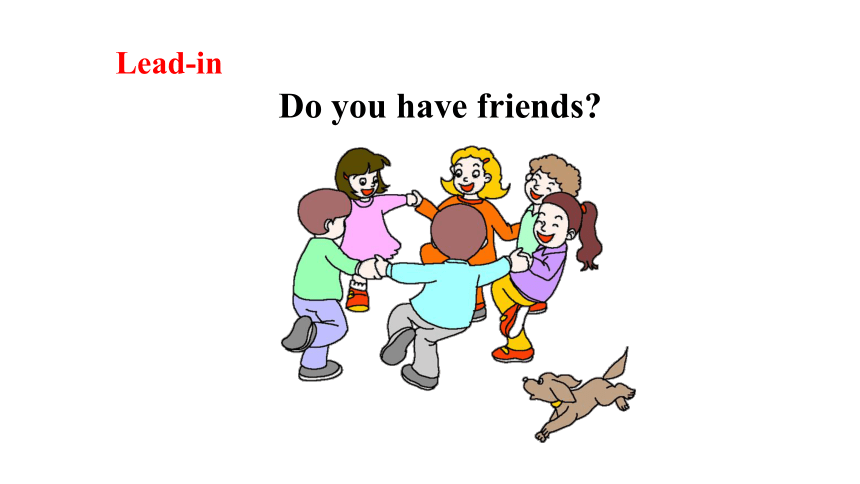
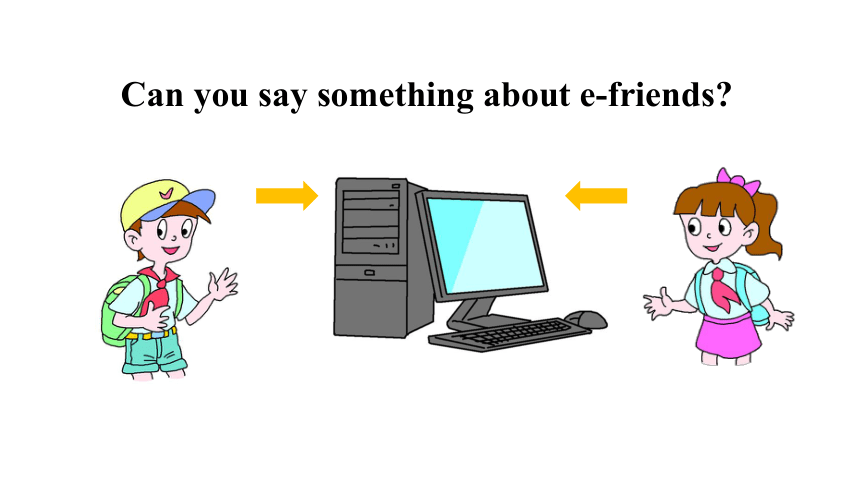
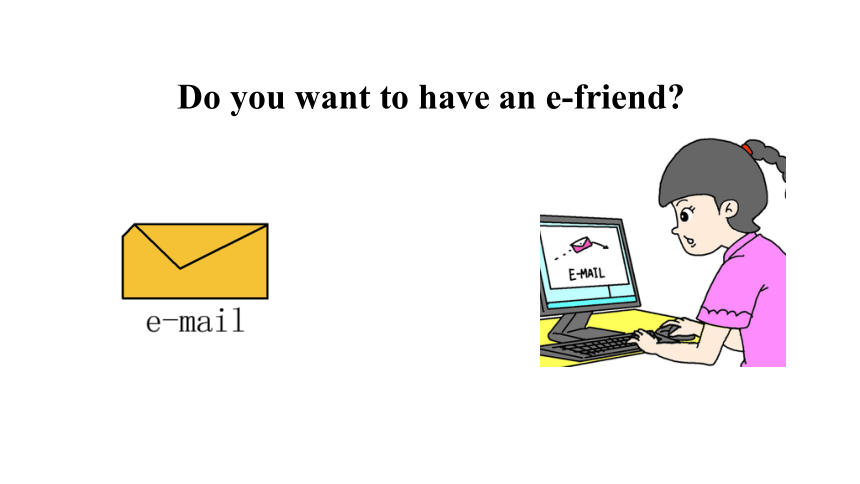




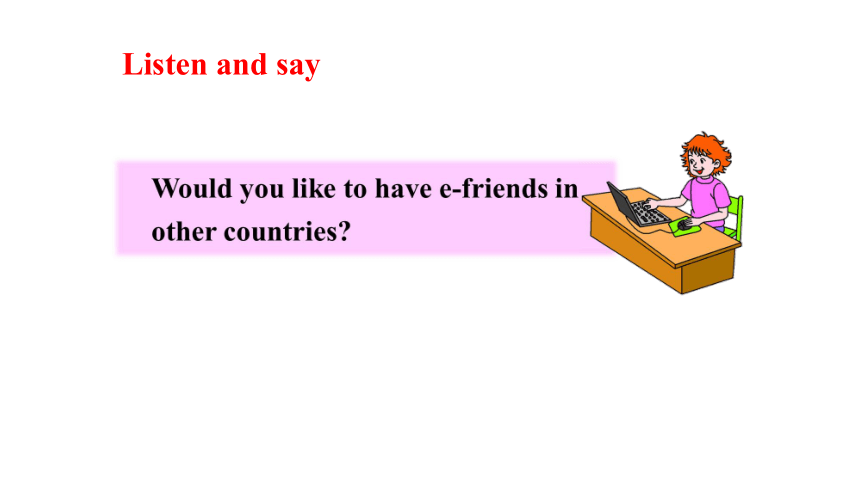

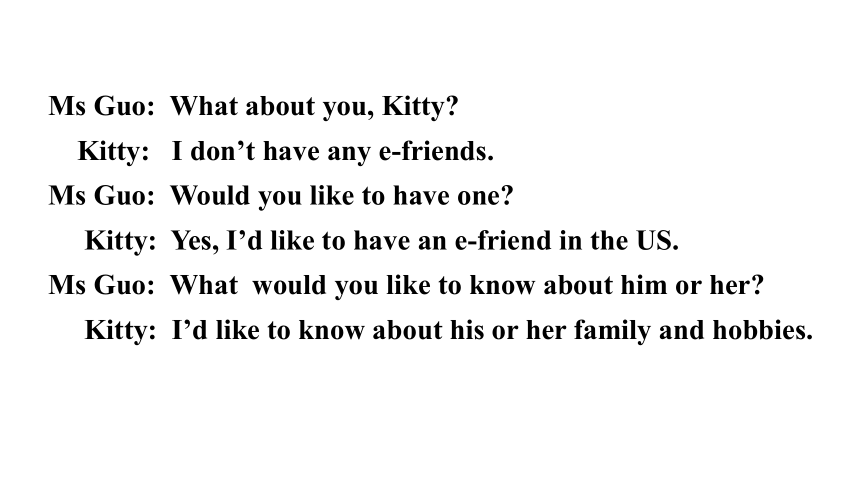

文档简介
课件52张PPT。Unit 6 E-friends沪教牛津·六年级上册Lead-inDo you have friends?Can you say something about e-friends?Do you want to have an e-friend?New wordse-friend网友country国家other其他的hobby业余爱好Listen and sayMs Guo: I have some e-friends in different countries. Do you
have any e-friends in other countries?
Joe: I have an e-friend in the UK. We both like football.
We often talk about our favourite football teams.
Jill: I have an e-friend in Australia. We often talk about
our favourite books and films.Ms Guo: What about you, Kitty?
Kitty: I don’t have any e-friends.
Ms Guo: Would you like to have one?
Kitty: Yes, I’d like to have an e-friend in the US.
Ms Guo: What would you like to know about him or her?
Kitty: I’d like to know about his or her family and hobbies. Who is Joe’s e-friend? Who is Jill’s e-friend? Who can be Kitty’s e-friend? Match and say.…is… ’s e-friend.
He’s /She’s from…
…can be Kitty’s e-friend.
He’s / She’s from… Amy Marks is Jill’s e-friend. She’s from Australia.Denis Smith is Joe’s e-friend. He’s from the UK.Gary Brown can be Kitty’s e-friend. He’s from the US. Play rolesDo you have any e-friends in other countries? Yes, I have an e-friend in Canada.No, I don’t.What about you?Would you like to have one?Yes, I’d like to have an e-friend in the US.Language points询问对方是否想做某事的句型结构:
Would you like to + 动词原形 + (其他)?
Would you like…? 你愿意……吗?1. Would you like to have e-friends in other countries?
你想有其他国家的网友吗?肯定回答:Yes, I’d like/love to.
否定回答:No, thanks.例:你愿意和我一起去吗?
Would you like to go with me?
是的,我愿意。
Yes, I’d like to.other作形容词,意思是“别的;其他的;另外的”。后面接单数或复数名词。
例句:你还能看到别的东西吗?
What other things can you see?2. Do you have any e-friends in other countries?
你们有其他国家的网友吗?拓展:other 与数词连用时的结构:
数词 + other + 复数名词
= 数词 + more + 复数名词例:我想再要三名学生。
I want three other students.再几个;又几个(1)others: 其他的人或物。相当于名词,可以独立使用。
例句:—Where are the children?
—Some children are in the living room, others
are in the garden.辨析:others, the other与another?(2)the other: 另一个;另一些
表示在已知的两个(或两部分)人或事物中。
常用结构:one…, the other…
例句:I have two e-friends. One is in Australia, the
other is in Canada. (3)another 泛指不定数中(三者或三者以上)的“另一
个”。another 前面不能用定冠词 the,当表示“再,又”
时,可以用“another + 基数词 + 名词”结构。
例句:This computer is small. Do you have another one? talk的意思是“交谈,谈话”,着重强调两者之间的交谈。
构成短语:talk to 对……讲话 talk with 与……交谈
talk about 谈论
例句:她正在与她的妈妈交谈。
She is talking with her mother.3. We often talk about our favourite football teams.
我们经常谈论我们最喜欢的足球队。(1)tell是及物动词,意思是“告诉,讲述”。
例句:我的妈妈每天跟我讲一个故事。
My mother tells me a story every night.辨析:tell, say与speak(2)say侧重说话的内容。
例句:我们的老师说“月亮绕着地球转。”
Our teacher says “The moon goes around
the earth.”(3)speak为及物动词,强调说的动作,侧重指说某种语言。
此外speak还可用于在较为正式的场合发表演讲或演说。
例句:你会说英语吗?
Can you speak English?Look and learnAustralia 澳大利亚Canada加拿大the UK 英国the US美国Look and readDear Gary,
My name is Kitty. I get your email from the E-friend Club. I’d like to be your e-friend.I am from China. I am 11 years old, and I wear glasses.
There are four people in my family: my father, my mother, my brother Ben and me. My father is a pilot. My mother is a nurse. My brother is a junior high school student.I go to Happy Primary School. I am in Grade Six. My favourite subjects are Maths and Music. I like singing and playing table tennis. I also like reading.
Please write back soon and tell me about yourself.
Yours,
KittyComplete the card for Kitty.Mummy/a brotherHappy Primary SchoolMusicsinging, playing table tennisand readingLanguage points wear的意思是“穿着;戴着”,是持续性的动作,表示穿着的状态,宾语可以是衣帽、饰物、奖章等。
例句:你最好穿暖和的衣服,外面冷。
You’d better wear warm clothes, it’s cold outside.4. I wear glasses. 我戴眼镜。 (1)in是介词,后面接表示衣服或颜色的词,着重于服装的款式或颜色。它所构成的短语只能作表语或定语。
例句:今天她穿着粉红色的夹克。
She is in a pink jacket today.辨析: in, put on, dress (2)put on的意思是“穿上,戴上”,强调“穿、戴”的动作,后面接衣服、鞋帽等。
例句:请穿这件外套,戴这顶帽子。
Please put on this coat and this hat. (3)dress的宾语通常是人,意思是“给……穿衣服”。
dress oneself / get dressed 给自己穿衣服
be dressed in 的意思是“穿着”,表示状态。
例句:小男孩现在会自己穿衣服了。
The little boy can dress himself now. like doing / like to do 喜欢做……
like doing 指一贯性的爱好或表示动作的习惯性和经常性。
like to do 表示一次性或偶然性的动作。
例句:她喜欢唱歌。
She likes singing.5. I like singing and playing table tennis.
我喜欢唱歌和打乒乓球。注意:love表示“爱,热爱,爱戴”,有强烈的感彩,相当于like…very much,侧重于对祖国或较亲近的人或事物的深厚感情。
例句:我爱我的妈妈。
I love my mother.Ask and answerWould you like to have e-friends in other countries? What would you like to know about your e-friends?S1 : Would you like to have e-friends in other countries?
S2 : Yes. I’d like to have an e-friend in…
S1: What would you like to know about your e-friend?
S2: I’d like to know about…Play rolesWould you like to have e-friends in other countries?Yes. I’d like to have an e-friend in the UK.What would you like to know about your e-friend?I’d like to know about his/ her school life.Think and writeTo:KittyRe: Be my e-friendSubject:Dear Kitty,
Thank you for your email and your photo. I’d like to be your e-friend too.
I am from_________. I am ________ years old.
There are__________ people in my family. I have a ___________. His name is Charles. Linda is my________.the US11fivebrothersisterI go to ______________School. ___________and ____________ are my favourite subjects. I like playing __________ and ___________.
Write soon.
Yours,
GaryTo:KittyRe: Be my e-friendSubject:Star PrimaryScienceEnglishfootballchessLearn the sounds1 fan van
2 smooth tooth
3 leaf live
4 then thin
5 fairy very
6 think fingerListen and circle.Culture cornerPeople in the UK love football.People in the US love football too, but their football games are different.
have any e-friends in other countries?
Joe: I have an e-friend in the UK. We both like football.
We often talk about our favourite football teams.
Jill: I have an e-friend in Australia. We often talk about
our favourite books and films.Ms Guo: What about you, Kitty?
Kitty: I don’t have any e-friends.
Ms Guo: Would you like to have one?
Kitty: Yes, I’d like to have an e-friend in the US.
Ms Guo: What would you like to know about him or her?
Kitty: I’d like to know about his or her family and hobbies. Who is Joe’s e-friend? Who is Jill’s e-friend? Who can be Kitty’s e-friend? Match and say.…is… ’s e-friend.
He’s /She’s from…
…can be Kitty’s e-friend.
He’s / She’s from… Amy Marks is Jill’s e-friend. She’s from Australia.Denis Smith is Joe’s e-friend. He’s from the UK.Gary Brown can be Kitty’s e-friend. He’s from the US. Play rolesDo you have any e-friends in other countries? Yes, I have an e-friend in Canada.No, I don’t.What about you?Would you like to have one?Yes, I’d like to have an e-friend in the US.Language points询问对方是否想做某事的句型结构:
Would you like to + 动词原形 + (其他)?
Would you like…? 你愿意……吗?1. Would you like to have e-friends in other countries?
你想有其他国家的网友吗?肯定回答:Yes, I’d like/love to.
否定回答:No, thanks.例:你愿意和我一起去吗?
Would you like to go with me?
是的,我愿意。
Yes, I’d like to.other作形容词,意思是“别的;其他的;另外的”。后面接单数或复数名词。
例句:你还能看到别的东西吗?
What other things can you see?2. Do you have any e-friends in other countries?
你们有其他国家的网友吗?拓展:other 与数词连用时的结构:
数词 + other + 复数名词
= 数词 + more + 复数名词例:我想再要三名学生。
I want three other students.再几个;又几个(1)others: 其他的人或物。相当于名词,可以独立使用。
例句:—Where are the children?
—Some children are in the living room, others
are in the garden.辨析:others, the other与another?(2)the other: 另一个;另一些
表示在已知的两个(或两部分)人或事物中。
常用结构:one…, the other…
例句:I have two e-friends. One is in Australia, the
other is in Canada. (3)another 泛指不定数中(三者或三者以上)的“另一
个”。another 前面不能用定冠词 the,当表示“再,又”
时,可以用“another + 基数词 + 名词”结构。
例句:This computer is small. Do you have another one? talk的意思是“交谈,谈话”,着重强调两者之间的交谈。
构成短语:talk to 对……讲话 talk with 与……交谈
talk about 谈论
例句:她正在与她的妈妈交谈。
She is talking with her mother.3. We often talk about our favourite football teams.
我们经常谈论我们最喜欢的足球队。(1)tell是及物动词,意思是“告诉,讲述”。
例句:我的妈妈每天跟我讲一个故事。
My mother tells me a story every night.辨析:tell, say与speak(2)say侧重说话的内容。
例句:我们的老师说“月亮绕着地球转。”
Our teacher says “The moon goes around
the earth.”(3)speak为及物动词,强调说的动作,侧重指说某种语言。
此外speak还可用于在较为正式的场合发表演讲或演说。
例句:你会说英语吗?
Can you speak English?Look and learnAustralia 澳大利亚Canada加拿大the UK 英国the US美国Look and readDear Gary,
My name is Kitty. I get your email from the E-friend Club. I’d like to be your e-friend.I am from China. I am 11 years old, and I wear glasses.
There are four people in my family: my father, my mother, my brother Ben and me. My father is a pilot. My mother is a nurse. My brother is a junior high school student.I go to Happy Primary School. I am in Grade Six. My favourite subjects are Maths and Music. I like singing and playing table tennis. I also like reading.
Please write back soon and tell me about yourself.
Yours,
KittyComplete the card for Kitty.Mummy/a brotherHappy Primary SchoolMusicsinging, playing table tennisand readingLanguage points wear的意思是“穿着;戴着”,是持续性的动作,表示穿着的状态,宾语可以是衣帽、饰物、奖章等。
例句:你最好穿暖和的衣服,外面冷。
You’d better wear warm clothes, it’s cold outside.4. I wear glasses. 我戴眼镜。 (1)in是介词,后面接表示衣服或颜色的词,着重于服装的款式或颜色。它所构成的短语只能作表语或定语。
例句:今天她穿着粉红色的夹克。
She is in a pink jacket today.辨析: in, put on, dress (2)put on的意思是“穿上,戴上”,强调“穿、戴”的动作,后面接衣服、鞋帽等。
例句:请穿这件外套,戴这顶帽子。
Please put on this coat and this hat. (3)dress的宾语通常是人,意思是“给……穿衣服”。
dress oneself / get dressed 给自己穿衣服
be dressed in 的意思是“穿着”,表示状态。
例句:小男孩现在会自己穿衣服了。
The little boy can dress himself now. like doing / like to do 喜欢做……
like doing 指一贯性的爱好或表示动作的习惯性和经常性。
like to do 表示一次性或偶然性的动作。
例句:她喜欢唱歌。
She likes singing.5. I like singing and playing table tennis.
我喜欢唱歌和打乒乓球。注意:love表示“爱,热爱,爱戴”,有强烈的感彩,相当于like…very much,侧重于对祖国或较亲近的人或事物的深厚感情。
例句:我爱我的妈妈。
I love my mother.Ask and answerWould you like to have e-friends in other countries? What would you like to know about your e-friends?S1 : Would you like to have e-friends in other countries?
S2 : Yes. I’d like to have an e-friend in…
S1: What would you like to know about your e-friend?
S2: I’d like to know about…Play rolesWould you like to have e-friends in other countries?Yes. I’d like to have an e-friend in the UK.What would you like to know about your e-friend?I’d like to know about his/ her school life.Think and writeTo:KittyRe: Be my e-friendSubject:Dear Kitty,
Thank you for your email and your photo. I’d like to be your e-friend too.
I am from_________. I am ________ years old.
There are__________ people in my family. I have a ___________. His name is Charles. Linda is my________.the US11fivebrothersisterI go to ______________School. ___________and ____________ are my favourite subjects. I like playing __________ and ___________.
Write soon.
Yours,
GaryTo:KittyRe: Be my e-friendSubject:Star PrimaryScienceEnglishfootballchessLearn the sounds1 fan van
2 smooth tooth
3 leaf live
4 then thin
5 fairy very
6 think fingerListen and circle.Culture cornerPeople in the UK love football.People in the US love football too, but their football games are different.
同课章节目录
- Module 1 Getting to know each other
- Unit 1 Growing up
- Unit 2 My summer holiday
- Unit 3 Healthy or unhealthy?
- Revision 1
- Project 1
- Module 2 Relationships
- Unit 4 Our neighbours
- Unit 5 Animals in dange
- Unit 6 E-friends
- Revision 2
- Project 2
- Module 3 Out and about
- Unit 7 Seeing a film
- Unit 8 Visiting museums
- Unit 9 Great cities of the world
- Revision 3
- Project 3
- Module 4 The natural world
- Unit 10 Ai
- Unit 11 Trees
- Unit 12 The Earth
- Revision 4
- Project 4
